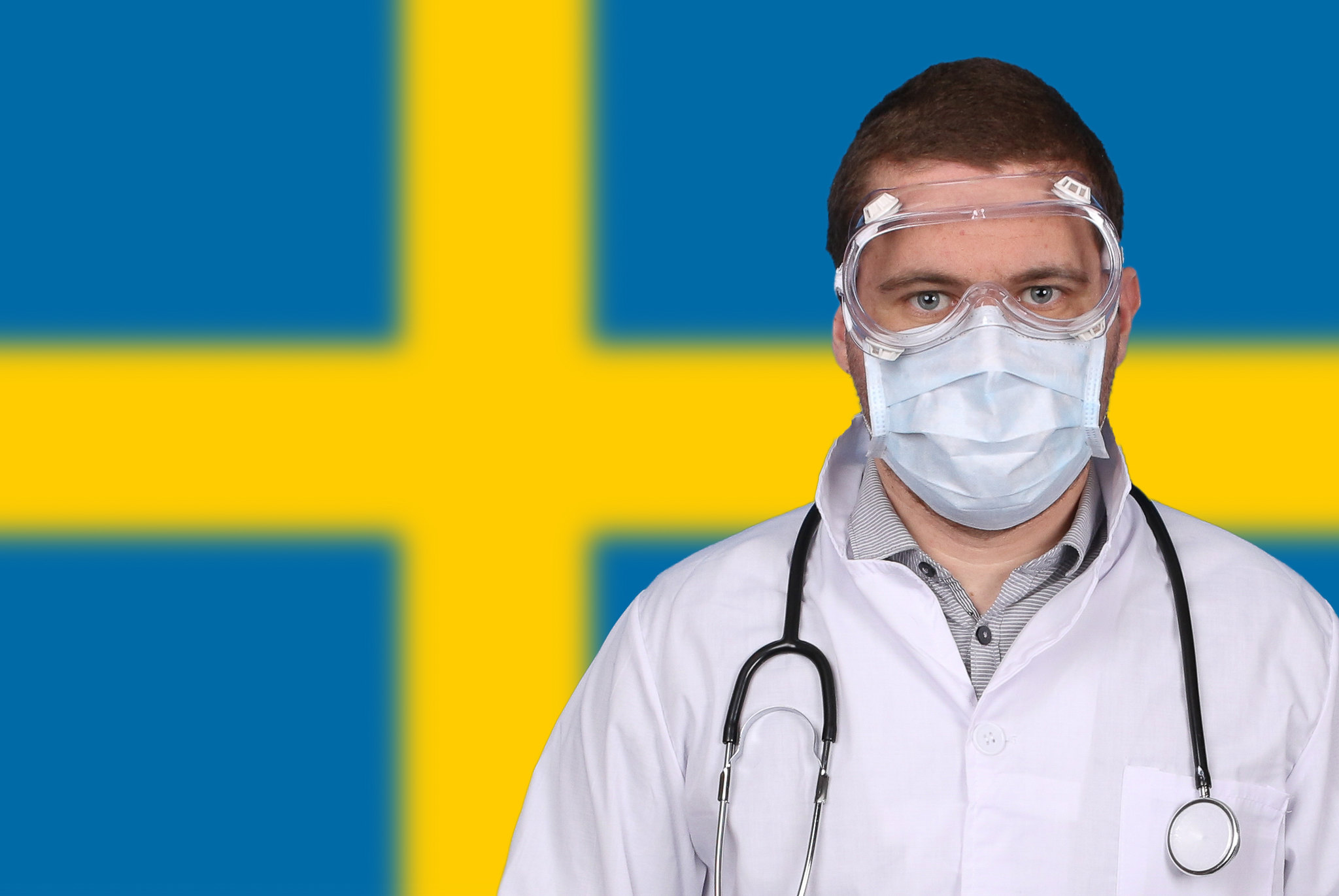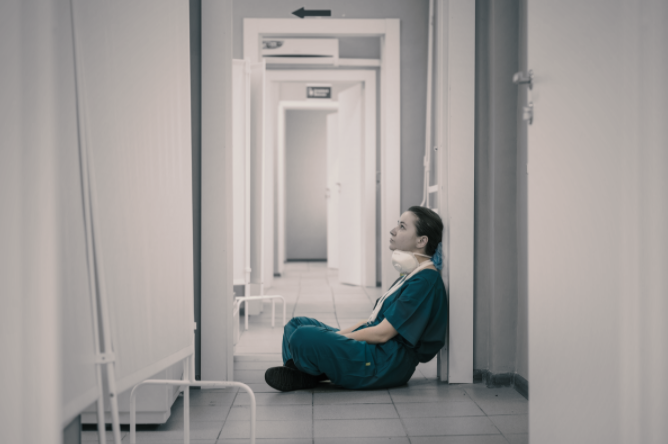“This autumn, too many people have neglected to follow advice and recommendations." This was the explanation for the deadly wave of coronavirus sweeping over Sweden given in late November by Prime Minister Stefan Löfven in an address to the nation. While shifting blame to the general public, he was conveniently silent about the government's responsibility for decades of cuts to healthcare, understaffing in the elderly care sector, and lacklustre testing capacity. Now the government has been forced to introduce several measures that they for a long time argued against. But it is all too, little too late.
In the spring and summer, the Swedish government and their paid officials at the Public Health Agency promised that their strategy would mean that Sweden would be better off in the long run. State epidemiologist Anders Tegnell said in an interview with Financial Times in May that: “during the autumn there will be a second wave, Sweden will have a high level of immunity and the amount of cases will probably be fairly low.” The idea was that, by not enforcing a lockdown and allowing a limited spread of infections, we would quickly achieve immunity, in Stockholm possibly already by May.
The Public Health Agency has been reluctant to speak of herd immunity, at least publicly. But internal correspondence shows that their strategy has been exactly that. On 16 March, Anders Tegnell said in an interview with Aftonbladet: “We have been careful not to use that term [herd immunity] because it has an air of resignation which is not at all the case. But… it [probably] has to come to that. We won’t get this under control in any other way.”
In the spring, when the WHO said “test, test, test”, the Swedish Public Health Agency claimed that “at this stage there is practically no medical need for an individual (!) to know if the acute infection is COVID-19”. Harriet Wallberg, appointed national test coordinator in May, explained to journalists that “the Public Health Agency… quite simply opted out of testing and contact tracing as a way to keep infection down. It was not a part of the strategy”.
A failed strategy
The facts are now clear: the Swedish strategy has failed. With 87.83 deaths per 100,000 inhabitants, Sweden has fared significantly worse than countries with more restrictive measures, and comparable healthcare, such as Denmark (23.66), Finland (10.24), and Norway (8.43). All the lofty promises of the politicians and their officials have proved to be completely wrong. With a vaccine around the corner, it is clear that many of these deaths could have been avoided.
 With 87.83 deaths per 100,000 inhabitants, Sweden has fared significantly worse than countries with more restrictive measures, and comparable healthcare, such as Denmark (23.66), Finland (10.24), and Norway (8.43) / Image: Jernej Furman, Flickr
With 87.83 deaths per 100,000 inhabitants, Sweden has fared significantly worse than countries with more restrictive measures, and comparable healthcare, such as Denmark (23.66), Finland (10.24), and Norway (8.43) / Image: Jernej Furman, Flickr
The price has been paid by the nearly 10,000 dead and their relatives, as well as those who toil in elderly care facilities, at health clinics and hospitals. Workers there are poorly paid, work hard enough for two and have been forced to go to work without personal protective equipment.
In November, the paper of the Municipal Workers’ Union interviewed one assistant nurse that explained how her colleagues were close to tears when they understood what the second wave would mean. “We have to clone ourselves, we’re insufficient… we’re already more tired than usual. There’s a risk that they will drive us to exhaustion and more will end up on sick leave. It’s a vicious circle, it would be better if they hired more people.”
Swedish nurses worked almost 2.2 million hours of overtime during the first eight months of 2020. At the Karolinska University Hospital intensive care unit, the workers have once again been ordered to work 12.5-hour shifts. “It’s like a recurring nightmare”, one nurse commented.
While austerity within healthcare and elderly care continued in many places, the government has put aside 25 billion euros in record-breaking crisis packages to businesses, and the central bank has offered cheap loans to companies and banks to the tune of 160 billion. The government is clearly ready to do considerably more to save a few hundred billionaires’ profits than to save lives.
A shift in policies
With close to 10,000 dead and the second wave out of their control, the Swedish authorities have been forced to make a partial retreat. A new emergency law was introduced on 8 January giving the government the power to close down shops, gyms and public transport.
A few weeks before Christmas, upper secondary schools were closed, and they will remain so until at least January 24. Secondary schools for ages 13–15 have also been allowed to shut down, although the Public Health Agency still argues that they should remain open where possible. Face masks, that Anders Tegnell for a long time argued against, are now recommended, although only in public transports during rush hour.
But the government and Public Health Agency refuse to admit that there has been anything wrong with the Swedish strategy. They astonishingly claim that they are following the same strategy as before and are simply adapting it to the “changed situation”. But they are finding that this fiction is increasingly hard to sell.
In the beginning of the pandemic most workers supported the government measures and confidence was high. But confidence in government policies have plummeted. Only 47 percent of the population now has confidence in the Public Health Agency, which had support from an overwhelming majority in the spring. After an initial surge the Social Democrats are also almost back at the same level of support as before the pandemic.
Their popularity has certainly not been helped by the fact that the politicians and high-ranking officials ignore their own recommendations. The prime minister himself, only days after his latest patronising speech chastising young people for not following recommendations, was spotted during Christmas holidays in a shopping centre where he had decided to get his watch fixed. Meanwhile, Dan Eliasson, the director general of the Swedish Civil Contingencies Agency, opted to travel to the Canary Islands to celebrate Christmas with his family with the explanation, “I thought it was necessary”. After months of ordinary workers and youth being told that they are to blame for the spreading of the virus, more and more have had enough of this hypocrisy.
The measures now introduced are clearly a result of a panic-stricken government reacting to their own obvious failure and their decreased support. But admitting any of this would mean that losing prestige, so they prefer to stay silent.
These new measures will not be enough as they do not address the main sources of the spread of the virus, nor the main weaknesses. The government refuses to add any significant funding to healthcare, that in many places were already in a severe state of crisis even before the pandemic. The Public Health Agency has said that homes and workplaces are the main sources of infection. Yet they are doing absolutely nothing to deal with overcrowded households in poor neighborhoods. And as for workplaces, the government has urged people to work from home, but this is an impossibility for 93 percent of blue collar workers that can’t work from home. It is not surprising that the risk of dying of COVID-19 is four times higher for people on low income than on high income.
If they really wanted to save lives, then the government would have introduced measures to shut down non-essential production. But this has proved to be both impossible and unthinkable within the limits of capitalism. Capitalist production has only one goal: to produce profits for the few.
Who is responsible?
Since the summer, the politicians have been quarreling over who is to blame for the thousands of deaths. “The government of Sweden has in cold blood allowed a large spread of infection in Sweden,” raved Ebba Busch-Thor, leader of the Christian Democrats, last summer. But in fact, it is her own party that is responsible for elderly care in Stockholm, where the highest number of people have died, and that furthermore recently cast the decisive vote to close down municipal elderly care in Huddinge. “The government is responsible and it is time to demand that responsibility" said Jimmie Åkesson from the racist, right-wing Sweden Democrats – despite the fact that his party in the beginning wholeheartedly supported the government’s strategy and has proved itself to be an austerity party in the municipalities they govern.
 All wings of the political establishment are to blame for this disaster / Image: European Centre for Diseases, Flickr
All wings of the political establishment are to blame for this disaster / Image: European Centre for Diseases, Flickr
In June, the leader of the conservative Moderate Party Ulf Kristersson claimed that the government’s “gawkiness” risked placing Sweden at the end of the line of countries who’ll have access to the vaccine. Ignoring the fact that it was under the leadership of his party in 1992 that the government pushed through the privatisation of the domestic vaccine production. In March, he said it was “unacceptable that several regions warned of a lack of basic medical supplies” and that the government should order the National Board of Health and Welfare to “lead and coordinate the task of buying, storing and distributing personal protective equipment”. But it was the right-wing, together with the Social Democrats, that dismantled the large emergency stockpile that once existed in Sweden. Additionally, it was the right-wing Reinfeldt government that sold out the state-owned pharmacy, thereby abolishing state responsibility for stockpiling medicines and equipment.
The right-wing can try to shift blame however much as they like. The fact is that they govern in 20 of 21 regions – those that in the Swedish system are mainly responsible for healthcare. Stockholm, Västra Götaland and Skåne, where almost half of the population lives, is governed by the conservative Moderate party. It can hardly be said that these regions were in any way better prepared for the pandemic, or acted more quickly once the pandemic hit. In Stockholm, where the Moderate Party has governed for 14 years, protective equipment such as masks and gowns ran out after only four days.
This so-called political “debate” is just a charade. In reality, they are all guilty. It is the right-wing and the Social Democrats both that have drained the welfare through cuts and privatisations. Here, the right-wing is of course the largest culprit and thus the biggest hypocrite. They are responsible for the large number of deaths in both the first and the second wave. Because they prioritise capitalist profits over lives.
Capitalism has failed – fight for socialism!
This catastrophe was not inevitable. Countries like China, Taiwan, New Zealand and Iceland have almost completely stopped the spread of the disease through a combination of lockdowns, mass testing and effective contact tracing. In the Chinese city of Qingdao, for example, 12 cases of COVID-19 were discovered – which resulted in all nine million of the city's population getting tested. This shows how the spread of the virus can be stopped.
If this is possible in a capitalist dictatorship like China then it is easy to imagine what would be possible in a socialist planned economy. Under capitalism, blind market forces and the naked profit interests prevail. But if the largest businesses were nationalised under workers’ control and the economy were organised for the needs of the many then we would have a completely different situation. What’s needed is to use science and coordinate all resources on a world scale according to a plan. That would provide the means to completely eradicate the virus, even without a vaccine.
Sweden has instead become an excellent example of the failure and inefficiency of capitalism.
While the state pays the wages for big businesses that made billions in profits in past years – and which are still making profits during the pandemic – many small businesses stand on the verge of ruin. Workers within the hotel, restaurant and retail sectors have faced layoffs or working reduced hours. Large, previously planned layoffs within the public sector have been temporarily stopped by emergency government funding, but sooner or later this money will run out. At that point, the cuts will continue.
Many workers that have been hailed as heroes – yet received pitifully low wage increases in the recent round of collective bargaining in October – will then get their final reward from the state: the boot, and subsequent unemployment. And as the economic crisis is not caused by the pandemic, it will not be over when the pandemic subsides. Workers who have been safe thus far thanks to being furloughed will not remain so – the capitalist crisis will sooner or later also affect the industrial sector.
Today, the leadership of the Social Democrats are open defenders of the capitalist system, just like the right-wing. They are unwilling to take any measures that encroach on capitalist profits. A programme against the pandemic must respond to the urgent needs of society, and must offer zero regard for capitalist property rights and profits. It is the capitalists, not the workers, that must pay for the crisis. We call on the whole working-class movement to fight for a socialist program, that we think should include:
- A massive extension of healthcare, with rapid training programs and better conditions that can encourage former healthcare workers to return to the profession. Arrange all healthcare within a national plan and expropriate any company that refuses to accept workers’ control.
- A rapid expansion of testing, as well as serious contact tracing.
- Reduce class sizes in schools by hiring workers and requisitioning the necessary buildings to accommodate social distancing. In the event of an outbreak, school staff, students and their families must be tested within 24 hours.
- Full compensation for everyone who tests positive and must stay at home.
- Full compensation for the unemployed and rapid training for unemployed willing to help in the welfare sector with guaranteed permanent employment after the pandemic.
- Stop all cuts, reduce working hours and improve conditions within the public transport sector. Immediately increase the number of departures to prevent congestion.
- Personal protective equipment, paid for by the employer, must be provided to all workers unable to work from home.
- Close all non-essential workplaces where workers' safety from the coronavirus cannot be guaranteed, with full pay for the workers. This should be determined by safety officers or committees of workers elected from the floor.
- Expropriate empty luxury apartments to reduce overcrowding. Prohibit evictions and introduce rent holidays for those affected by the crisis.
- Financial assistance to small businesses, but not to large companies, which should use their accumulated profits. If they can’t or won’t do that major companies should be immediately expropriated.
- Prohibition on layoffs, and involuntary reduction of working hours and part-time work. If companies claim that they cannot afford to keep all their workers, they must open their books for the workers to review. If any company really can’t afford it, they should be nationalised without compensation to save the workers' livelihood.
- The failure of handling the pandemic is the failure of capitalism. To fight COVID-19, we must fight capitalism.

